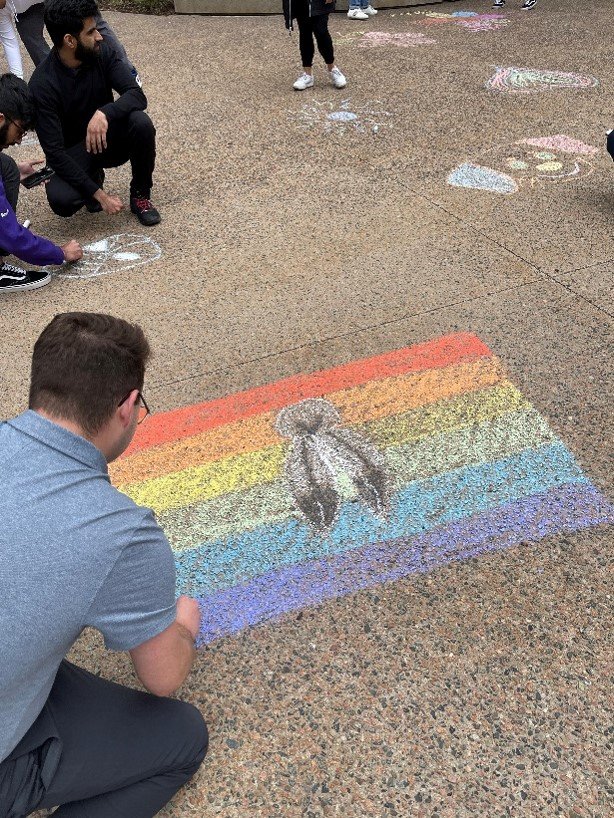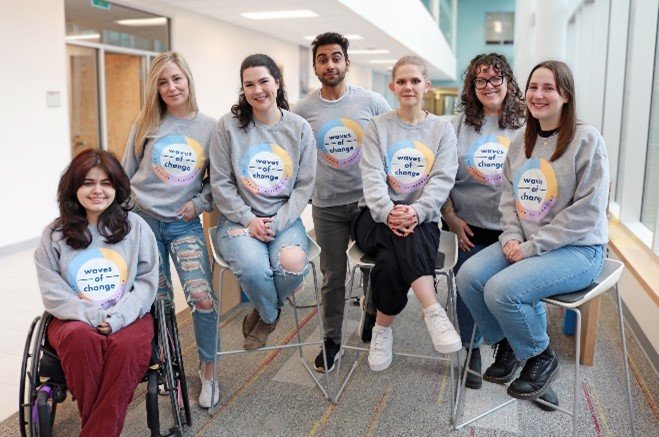New travel bursary supports accessibility and inclusion in academic experiences
July is Disability Pride Month, an opportunity to celebrate the experiences and achievements of the disability community while acknowledging the diverse challenges they may face. The 2024 theme for Disability Pride Month is “We want a life like yours,” which reflects the desire of the disability community to be given equal opportunity to engage in experiences they are often denied.
At Saint Mary’s, we use this month as a chance to further our ongoing commitment to creating equal opportunities for students to further their academic careers. “We aspire to create a learning environment that is fully experienced by all students,” says Becca Chaytor, Acting Manager, Fred Smithers Centre for Student Accessibility (FSC). “The Accessibility Travel Bursary helps reduce some barriers in travel-related academia, creating opportunities for students who experience disabilities to engage in hands-on learning they may not otherwise have been able to participate in.”
Launched in 2023, the Accessibility Travel Bursary was initiated by a generous donor to support accessible student travel for academic, co-curricular activities or research purposes.
Masters student Baden Mercer participated in a field course in Rome, Italy with support from the Fred Smithers Centre Accessibility Travel Bursary
Awarded throughout the year, students can receive funding to assist with the costs associated with travelling during their degree program. This can include travel to attend field schools and conferences, participate in study abroad opportunities and more. The financial assistance not only helps to cover travel expenses but also accommodation or assistive supports that may otherwise have been a barrier to travel experiences.
In its inaugural year, twelve bursaries were awarded, allowing students to participate in domestic and international travel relevant to their studies. Master’s student Baden Mercer BA’22 was one such recipient—his study travels led him to a field course in Rome. Currently in his third year as a graduate student in the Master of Theology and Religious Studies program, Baden’s trip focused on sacred spaces in Christian and ancient Roman settings.
“As a student with a disability, the financial assistance for the field course provided me with the support I needed while travelling away from home,” says Baden. “Not only was it an incredible experience, but the exposure to these places and the learning within the field course have greatly contributed to my Master’s thesis work.”
Payton McPhee MSc’24, third-year student in the Master of Science, Applied Psychology (forensic stream) program, was another 2023 bursary recipient. Travelling to Kingston, Ontario, Payton had the opportunity to shadow her former professor, Dr. Simone Cunningham, Clinical and Forensic Psychologist, at Millhaven Institution, a federal men’s maximum-security prison.
“As a Master’s student, there is an expectation to seek experiential learning opportunities and attend academic conferences,” acknowledges Payton. She was excited to learn about the Accessibility Travel Bursary as it was the first grant she had come across that provided academic travel-related financial assistance for students with disabilities. “The bursary provided me with an additional avenue of funding that made travel more accessible for me,” she explains.
In reflecting on her experience, Payton acknowledges that she would not have been able to travel to Ontario for the hands-on learning opportunity without the financial support through the bursary. “It provides students with funding to make their goals and aspirations more attainable,” claims Payton. “For many, travelling seems unrealistic and almost impossible, but the financial assistance provided through the bursary makes these experiences more realistic.”
Both Bayden and Payton emphasized the benefits of having the Accessibility Travel Bursary available to FSC-registered students. “Traveling abroad not only helped me to advance my academic studies,” affirms Bayden. “It also gave me a deeper understanding of the world beyond our campus. A true world without limits.”
To learn more about the Accessibility Travel Bursary, visit the Fred Smithers Centre website. If you have questions about the Accessibility Travel Bursary or the Fred Smithers Centre, reach out to fredsmithers.centre@smu.ca.
An exploration of Indigenous history, perspectives and culture through the Saint Mary’s lens
June was National Indigenous History Month (NIHM). At Saint Mary’s, we are committed to a campus and community that acknowledges, respects and values the contributions of Indigenous peoples, both within the Saint Mary’s community and the broader provincial landscape. NIHM reminds us to take time to learn and engage in respectful and productive discussions to explore where we have come from and how we move forward together as Treaty people.
Outlined by the Government of Canada, each week of NIHM highlighted a different theme related to aspects of Indigenous ways of knowing and being: environment, traditional knowledge and territory; children and youth; languages, cultures and arts; and women, girls and 2SLGBTQI+ people. These themes are an excellent starting point in exploring Indigenous history, perspectives and culture through the Saint Mary’s lens.
Week 1: Environment, Traditional knowledge and territory
Many within our SMU community are familiar with the land acknowledgement and our place in Mi’kma’ki. However, it’s important for us to understand its historical context, significance and meaning.
Mi’kma’ki is made up of seven districts that span all of Nova Scotia and Prince Edward Island, as well as large areas of New Brunswick, the Gaspé Peninsula and Newfoundland. The districts include Epekwitk aq Piktuk, Ktaqmkuk, Unama’kik, Skikewa’kik, Kespukwitk, Siknikt, Kespe’k and Sɨpekne'katik.
The Mi’kmaq are among the original inhabitants of the Atlantic region in Canada and have occupied their traditional territory since time immemorial. Archaeological evidence and oral history indicate a Mi’kmaq presence in this territory for more than 10,000 years, long before English settlers arrived in the mid-1700s.
Week 2: Children and Youth
In Indigenous cultures, elders are the ones who hold knowledge, passing down information throughout generations. Nujikina’muet (someone who teaches) often use storytelling to pass down history, life lessons, sharing of experiences and guidance. Teaching is also done through kina’masuti (instruction), which is the method of passing on knowledge through hands-on learning and demonstration.
With more than 6000 students pursuing their education here, Saint Mary’s University is focused on the academic growth, well-being and success of youth. Fostering the kekina’masuti (learning) of Indigenous students, like fourth-year student Lauryn Mason, supports opportunities for personal growth and developmental experiences as well as future readiness.
Lauryn is from Sackville, Nova Scotia; however, her family comes from Odawa M’nis (Manitoulin Island). Working to complete her Bachelor of Science with Honours in Chemistry, Lauryn recently defended her honours thesis entitled, An investigation of the applications of localization delocalization matrices on the prediction of reaction characteristics, which now resides in the Patrick Power Library. “Successfully defending my Honours thesis and having it submitted to the library is one of my proudest moments here at SMU,” reflects Lauryn.
While Lauryn prepares to close one chapter of her learning, she is already looking toward the next one as she is in the early stages of exploring the possibility of starting a Masters of Applied Science, where she may focus on working with small molecules here at Saint Mary’s.
In considering the future of Indigenous students at Saint Mary’s, Lauryn notes, “I think that Indigenous people are really strong, and there are more and more opportunities for Indigenous students every year. I think that these two factors combine to make a really bright image of the future for Indigenous scholars and academics.”
Week 3: Languages, Cultures and Arts
At Saint Mary’s, you will find a number of ways that Indigenous culture is reflected in the institution.
The Patrick Power Library is host to the Mi’kmaq Cultural Materials Display as part of an ongoing collaboration with the Nova Scotia Museum, the Indigenous Student Advising Office and the Indigenous Students’ Society.
Found on the main floor of the Library, the display includes beaver incisors for carving and woodworking, fragments of pottery, an axe head and other artifacts. This collection is accompanied by a selection of books written by indigenous authors, and books about indigenous cultures.
Around campus, you will also find a couple of pewitekemkewey (dream catchers). The main foyer of the O'Donnell Hennessey Student Centre and the Patrick Power Library are the home to these beautiful pieces. These pewitekemkewey were created by former SMU student Isaiah Bernard and his father, Wilbert Marshall, of Potlotek First Nation, in 2020.
Isaiah notes that the dream catcher originates from the Ojibwe nation. The design of the dream catcher mirrors that of the spider’s web, catching our bad dreams while allowing our good dreams to pass through as we sleep.
He shares the story of “a grandmother [who] patiently watched each day as a spider spun his web above her sleeping place until one day her grandson noticed the spider and tried to kill it.
“Don’t hurt him,” she told the boy in a soft tone, surprising him.
“But grandmother, you should not protect this spider.”
When the grandson left, the spider thanked the woman for her protection and offered her a gift. “I will spin you a web that hangs between you and the moon so that when you dream, it will snare the bad thoughts and keep them from you.”
At this, the grandmother smiled and continued to watch the spider spin his web.”
Week 4: Women, girls and 2SLGBTQI+ people
In 2023, Student Affairs and Services hosted the inaugural Paint Your Pride event, where the SMU community was invited to draw pride-centric chalk images in the Quad outside of the Student Centre. Among other things, the event gave the community a unique opportunity to explore the breakdown of the 2SLGBTQIA+ acronym and explore the associated flags that represent the many different identification components within the queer community.
According to the Wabanaki Two Spirit Alliance (W2SA), the ”2S” in the acronym represents “two-spirit”, which is an umbrella term that encompasses Indigenous people “who demonstrate their identity primarily through culture and spirituality. They have emotional and sexual relationships with the same gender.”
The two-spirit flag depicts a rainbow with two feathers coming down from a circle. The feathers represent male and female, while the circle represents unification of masculine and feminine, reflecting dual spirit which transcends traditional gender roles.
As noted by John R. Sylliboy, co-founder of the W2SA, there is a “lack of ancestral knowledge or research about this concept in Mi’kmaq,” and the common Mi’kmaw term turning up in research is used in negative connotation. Instead, in his article Using L’nuwey Worldview to Conceptualize Two-spirit, John borrows from other Indigenous cultures for two-spirit concepts.
In exploring the final week’s theme, we cannot ignore the harsh truths of gender-based violence, hatred and systemic racism and oppression that significantly impact women, girls and 2SLGBTQI+ people.
Sensitive subject matter notice re: missing and murdered Indigenous women, girls and 2SLGBTQI+ people. If you need immediate emotional assistance, call 1-844-413-6649.
In its 2019 report, The National Inquiry into Missing and Murdered Indigenous Women and Girls (MMWG) concluded that “persistent and deliberate human and Indigenous rights violations and abuses are the root cause behind Canada’s staggering rates of violence against Indigenous women, girls and 2SLGBTQIA people.”
The National Day of Action for Missing and Murdered Indigenous Women and Girls and Two Spirit People, also known as Red Dress Day, is commemorated annually on October 4. In 2022, a Red Dress display was installed in the windows of the Patrick Power Library in collaboration with the Indigenous Student Advisor and the Indigenous Students’ Society. The dresses symbolize and honour the women, girls and Two-Spirit people who are missing and murdered.
Red Dress display in the Patrick Power Library
The 2SLGBTQIA+ Sub-Working Group published a MMIWG2SLGBTQQIA+ National Action Plan which, alongside the history and data, notes the resiliency and resurgence for two-spirit people and reimagining the possibility of a better future.
Since the early 1990s, Indigenous authors, scholars, and educators implemented the term Two-Spirit as a source of resurgence. The report states, “The movement by Two-Spirit People to shift the power of balance back in the hands of Two-Spirit People began by continuously acknowledging their traditional knowledge and cultural teachings as part of the ceremonial circles.”
Much like the Truth and Reconciliation Commission’s Calls to Action, the National Action Plan highlights necessary steps in developing a framework towards building change. As Treaty people, we are called to uphold the rights and responsibilities set forth for all of us residing within Mi’kma’ki. By learning the history of the land, people and culture, we can work towards repairing relationships and meaningful reconciliation.
To learn more about Indigenous community, culture and resources, along with relevant news and upcoming events at Saint Mary’s, visit the Indigenous Community Hub.
Students can connect with the Indigenous Student Advisor, Kylar Johnson, by reaching out to indigenous.advisor@smu.ca.
Acclaimed multi-sport athlete turned CBC sports broadcaster
Signa Butler BA’96 Hons’98
As a kid, Signa Butler BA’96 Hons’98 was an early and committed sports fan. She read the sports section of the newspaper from front to back and routinely begged her parents to let her stay up and watch Hockey Night in Canada. She was also the only girl talking sports in the schoolyard with all the guys.
“My ultimate choice of career was not a surprise to anyone who knew me back then,” laughs the CBC Sports play-by-play commentator, host, and writer. Her career spans 20 years, 12 Olympic Games, and a long stint as the national morning sports host. Today, Signa is one of the only women on the network who does play-by-play for a growing list of sports, including freestyle skiing, speed skating, diving, volleyball and soccer.
Growing up in Halifax in the 1980s and 1990s, Signa was always a multi-sport athlete. She played soccer and basketball and was a competitive gymnast, all before high school. When she started at St. Patrick’s High, she added indoor field hockey to the mix. For the next three years, she played soccer, basketball and field hockey at the varsity and provincial levels.
Upon graduation, Signa was recruited by several universities but chose Saint Mary’s because it was a school she was already super familiar with. Her parents, Richard and Christine, are both alumni. She’d grown up going to Saint Mary’s sports camps, and their whole family had attended countless Huskies games over the years.
While her goal was to play both soccer and basketball at University, she soon realized that her greater strength and her best potential lay in soccer. And she was lucky enough to have not one but three phenomenal coaches during her five years at Saint Mary’s.
Two of them—Linda Whitehead and Joanne Evans—were head coaches at a time when not many women were in that role. “They fought really hard for resources and equality in those early days,” says Signa, adding that their passion and dedication inspired a group of young women who were student-athletes.
Joanne Evans BSc’89 BEd ’90, head coach from 1995-1997, was similarly impressed with Signa. “She was not only an accomplished soccer player but an excellent team captain, leading with integrity and determination,” says Joanne, who had been a star Huskies soccer player herself. Calling her a “firecracker,” Joanne says Signa was a natural leader, full of the kind of spunk and personality that has made her a success at CBC Sports. “As a Saint Mary’s alumna, I’m so proud to watch Signa advocate for women’s sports across Canada and around the world.”
A firecracker, indeed. During her time on the Huskies women’s soccer team, Signa received numerous awards and accolades. She was a four-time Atlantic University All-Star, AUS MVP, and a first-team All-Canadian in her fifth and final year.
In addition to making life-long friendships, she fondly remembers the team’s early morning runs at Point Pleasant, the sound of sneakers on the gravel paths as they sprinted up the hills of Halifax’s urban seaside park. And then there was the Nova Scotia weather during hurricane season when one side of the turf was a lake and the other was a wind tunnel that the ball got stuck in!
Signa credits Saint Mary’s and some of the legendary professors she had in both the English and Political Science departments with creating a foundation for future learning and growth. In fact, it was at Saint Mary’s where some of the building blocks toward her dream of being a sports broadcaster came together. She worked as a writer for the university’s student newspaper, the Journal, covering sports of all kinds, and in her fifth year, took on the role of Editor. She then applied to Toronto Metropolitan University (formerly Ryerson), earning herself a Masters in Journalism.
Signa and her father Rick at the 2018 Homecoming Soccer Alumni Reunion
Signa marvels at how far female university sports, and women’s sports in general, have come in the 25 years since she graduated. “Being a female university athlete in the 1990s, you were largely invisible. You weren’t in newspapers, you didn’t have access to a lot of resources or the best field times, and you probably had to fundraise or pay for your uniform out of your own pocket,” she says. “We were thought of as lesser than everyone else. And I think I’ve taken that lesson and flipped it.”
In her current job, she uses her position to leverage the stories of women athletes, coaches and women’s teams. In her writing, she makes a point of highlighting the women’s side of sport, often choosing an athlete or a sport that is a little lesser known and sending a little airtime their way. “These women deserve to be in the headlines as much as anyone else.”
She’s especially excited these days about the Canadian Women’s Volleyball team who have a female head coach—the only female head coach in the top 30 nations in the world—and who seem poised to qualify for the Paris Olympic Games this summer.
To say that Signa loves her job is a massive understatement. She feels grateful to have made her dream of becoming a sports commentator come true and has a piece of advice for other young women coming up in sports. It’s something she wishes she’d been able to tell herself during her own university sports career:
“You belong here. You deserve to be here.”
Join Saint Mary’s Alumni in celebrating the 50th anniversary of women in varsity sport at Homecoming this October.
National Indigenous History Month 2024
June is National Indigenous History Month in Canada, an opportunity to learn about the unique cultures, traditions and experiences of First Nations, Inuit and Métis. It's a time to honour the stories, achievements and resilience of Indigenous Peoples, who have lived on this land since time immemorial and whose presence continues to impact the evolving Canada. June 21 is National Indigenous Peoples Day.
Saint Mary’s University acknowledges its location in Mi’kma’ki, the traditional land of the Mi’kmaq Nation. The Mi’kmaq flag flies proudly on the University’s campus.
Visit the online Indigenous Community hub to see news, events and resources.
Meet the new Indigenous Student Advisor
Kylar Johnson, a recent graduate of the Sobey School of Business, has returned to SMU and recently assumed the Indigenous Student Advisor role in Student Affairs and Services.
Kylar is from the Mi’kmaw community of Potlotek First Nation in Unama’ki and credits his time working with the Red Road project in his hometown for helping him become more in touch with his culture and broadening his knowledge. He furthered his experience volunteering at the Ottawa Inuit Children’s Centre, gaining new insight into Inuit culture.
“SMU has a vibrant Indigenous community and I look forward to fully immersing in this journey with students and amplifying their narratives within the context of the institution.”
Learn more about Kylar and his role, and follow @smu_studentlife for updates from Kylar throughout the month of June.
Creation-Centred Design: A Pathway for Problem Solvers
Friday, June 14, 2024
10 a.m.-1 p.m.
Arthur L. Irving Entrepreneurship Centre, Discovery Zone
Join Akwekon for a hands-on workshop on Creation-Centred Design, a transformative approach that harmonizes innovation with Indigenous wisdom and perspectives. This workshop, led by Michael Maracle-Polak and Keisha Turner BA’12, will immerse you in a methodology that respects and incorporates traditional knowledge into modern design and problem-solving processes.
Reading collection
The Patrick Power Library is featuring a collection of library resources for National Indigenous History Month, on display on the ground floor of the library. Book recommendations will be shared online throughout the month on our social channels (@smuhfxlibrary). All books can be borrowed with your SMU ID card, or accessed online using your SMU email and password.
Browse the full National Indigenous History Month collection online.
Also, check out the library’s Indigenous Studies guide, with more book recommendations, suggested journals, databases, government information, and other resources.
Learn about the weekly themes of National Indigenous History Month 2024:
Environment, traditional knowledge and territory
Children and youth
Languages, cultures and arts
Women, girls and 2SLGBTQI+ people
Call for participants: First Nations athletes' transitions to university sport and everyday life
Call for Research Participants for a study on First Nations athletes' transitions to university sport and everyday life. The Scott McCain & Leslie McLean Centre for Sport, Business and Health is seeking participants ages 18+ to complete a 20-30 minute survey by July 5.
Learn more and complete the survey.
Pride Season 2024 at Saint Mary's
Pride Season at Saint Mary’s is celebrated throughout June and July, recognizing Pride Month in June and the Halifax Pride festival in July. The pride flag will be flown on campus throughout June.
Pride is an acknowledgement of the 2SLGBTQIA+ community (two-spirit, lesbian, gay, bisexual, transgender, queer/questioning, intersex, all other gender identities such as asexual, pansexual, and polyamorous). It spotlights the resilience, celebrates the talent and recognizes the contributions of 2SLGBTQI+ communities. Learn more about Pride Season and its origins in Canada and visit our online 2SLGBTQIA+ hub for resources at Saint Mary’s.
Join us this Pride Season in supporting and uplifting members of our #SMUcommunity!
Paint Your Pride!
Tuesday, June 18
11:30 a.m.-1:30 p.m.
The Quad outside the O’Donnell-Hennessey Student Centre
Join Student Affairs and Services in the Quad to Paint Your Pride with chalk, play fun lawn games and enjoy snacks to celebrate Pride Month alongside your peers, staff and faculty!
Pride-Themed Movie Night
Wednesday, June 26
6 - 8:30 p.m.
Atrium 101
The Student Success Centre is hosting a Pride-themed Movie Night! Celebrate Pride with the Peer Success Coaches and a classic movie. We’ve got a few great movie choices, and you can cast your vote when you register. Blankets will be provided. Bring a friend!
SMU in the Halifax Pride Parade
The entire SMU Community is invited to join SMU Alumni and SMUSA in the Halifax Pride Parade on Saturday, July 20 at 12 p.m. The group will walk the parade route and celebrate our Husky Pride!
SMUSA Pride Centre
Open Monday-Friday, 9 a.m.-3 p.m.
Located in the O’Donnell Hennessey Student Centre, SC 106
The Pride Centre offers a safe space for all members of the 2SLGBTQIA+ community. SMUSA strives to create more events and resources for students within this community on campus and wants to create a welcoming and accepting environment for all. If you are looking for a hang-out spot or place to study, check out our pride centre!
Mental health support for queer and trans students
Students who are part of the queer and trans community may have unique experiences that impact their mental health. Sometimes, it can be easier to speak with someone who has similar experiences—enter our newest therapist in the Counselling Centre, Derek!
Derek is World Professional Association for Transgender Health (WPATH) trained and brings extensive knowledge of trans and queer mental health to the team, as well as the ability to write WPATH assessment and surgery letters for Trans Affirmative Healthcare.
Saint Mary’s Pride Collection
The Saint Mary’s Campus Store has Pride merchandise to help you celebrate Pride Season in style!
Available at the Campus Store in the Loyola Academic Building from 10 a.m.-3 p.m., and the Bookstore in the Student Centre from 9 a.m.-4 p.m., Monday to Friday or order online.
Check the Student Life events calendar for all upcoming events!
Related Content
Faculty and staff: use the Email Signature Template to add pronouns to your email signature
Dianne Chiasson: forty-plus years of enduring friendship in sport
Dianne Chiasson BA’81
You won’t find Dianne Chiasson BA ’81 Hons sitting around watching other people play sports. She’s a doer, not a watcher. And an adventurous doer at that.
A multi-sport athlete at Saint Mary’s in the late ‘70s, Dianne has remained active right into her retirement years. In the decades since she graduated, she’s taken up running, biking, golf and skate-skiing. She’s completed numerous marathons, including the Boston Marathon, and has participated in many Grand Fondo biking events.
She’s always been this way - active and athletic. As a child with a father in the Air Force, her family moved around a lot—Labrador, Goose Bay, Northern Quebec—but wherever she went to school, she played whatever was presented. “If it was on offer, I tried it,” she laughs.
In Grade 7, the family settled in the Annapolis Valley, in Auburn, near the base in Greenwood. Dianne played volleyball, basketball, softball and field hockey, in addition to running track, but was soon faced with having to choose her favourites due to overlapping schedules. A sports camp in Halifax one summer helped develop her basketball and field hockey skills; these ended up being the two sports she would carry with her to university.
But excelling at certain sports didn’t stop Dianne from venturing further afield. She even tried out for her high school hockey team, even though she couldn’t skate very well. “My basketball coach wasn’t very impressed with that,” she says. “But it was fun - why wouldn’t I try it?"
Dianne displayed the same independent streak when it came time to figure out what to do after high school. She went against the grain for someone living in the Valley: “I didn’t want to choose Acadia because everyone I knew was going there.” She was drawn to the big city, so when Saint Mary’s offered her an academic scholarship, that cinched the deal.
She decided to study Political Science and became a star player on both the Women’s Basketball and Field Hockey teams. She was named Female Rookie of the Year in 1978, as well as MVP of the basketball team, and earned Female Athlete of the Year for three years running. She was also selected All-Conference on numerous occasions for both field hockey and basketball and received All-Canadian honours.
“Dianne was an immensely talented and hard-working athlete, but someone who didn’t draw attention to herself and her own accomplishments,” says Kathy Mullane, who served as the coach of both women’s field hockey and basketball at the time. “She was our top player and won most of the athletic awards in her years at Saint Mary’s, but was incredibly humble. She was someone you wanted on every team, just a consummate team player, fitting in with everyone and so consistent in her play and positive attitude.”
In addition to her accomplishments on the field and the court, Dianne also excelled academically. She earned a full academic scholarship each year at Saint Mary's, accumulating 14 A's in 15 courses and was interviewed for a Rhodes Scholarship.
Once she graduated, she worked for a year in the Registrar’s Office at SMU before moving west to work for a small oil and gas company. After five years in Calgary, the East called her back home, and she returned to Halifax to secure a job with the Office of the Auditor General of Nova Scotia. Her political science degree came in handy, as did the Intro Accounting course she’d taken and liked at Saint Mary’s. Dianne got her accounting designation and spent the rest of her career working as an auditor.
During those years, she stayed connected to Saint Mary’s and enjoyed volunteering her time as a scorekeeper for the women’s basketball games. She marvels at the opportunities that now exist for young women to continue playing sports after university graduation. And she has a piece of advice for the new players coming up:
“Enjoy every minute of it because it goes by so fast.”
Forty-plus years later, the thing that Dianne cherishes the most are the friendships she still has with a handful of the other women on those Huskies sports teams. “After all these years, we still get together, and we still enjoy each other’s company,” she says. “Our friendships are the thing that remain and are something I am most proud of.”
By Renée Hartleib
Recent SMU graduate Kylar Johnson takes new role as Indigenous Student Advisor
Kylar Johnson BComm’23, Indigenous Student Advisor
Saint Mary’s is pleased to welcome Kylar Johnson, a recent graduate in the Sobey School of Business, back to SMU. He has recently assumed the Indigenous Student Advisor role in Student Affairs and Services.
Kylar brings a unique student perspective, having experienced pre-pandemic, remote learning, and the return to in-person learning during his undergraduate degree. During these varied student experiences, Kylar was very active within the SMU community. In addition to helping to re-establish the Drama Society after the pandemic, Kylar served as President of the Indigenous Student Society and assisted in bringing the Mawio’mi celebration back to SMU with the return of in-person learning.
After his convocation, Kylar secured a role working with Mi’kmaw Kina’matneway as a post-secondary navigator, where he developed cultural events and programming to support Indigenous students transitioning to life in post-secondary education in Mi’kma’ki. “The role helped me gain valuable insight on what students are going through, worrying about or trying to navigate as they first enter university life,” Kylar notes. “I remember feeling lost as a new student at SMU, but the support I received from the Indigenous Student Advisor and President of the Indigenous Student Society really helped me feel comfortable on campus, and I felt like SMU was a place where I could settle down.”
Kylar is from the Mi’kmaw community of Potlotek First Nation in Unama’ki and credits his time working with the Red Road project in his hometown for helping him become more in touch with his culture and broadening his knowledge. He furthered his experience volunteering at the Ottawa Inuit Children’s Centre, gaining new insight into Inuit culture. “These roles sparked my interest in learning more about other Indigenous cultures and opened me up to interactions that I wouldn’t have otherwise experienced,” Kylar describes. “SMU has a vibrant Indigenous community and I look forward to fully immersing in this journey with students and amplifying their narratives within the context of the institution.”
The Indigenous Student Advisor role supports and engages Indigenous students throughout their time at SMU. The Advisor provides guidance, develops community programming and helps to bring culturally respectful perspectives to light through reconciliation initiatives, advocacy and community-centered relationship building.
“When I saw the Indigenous Advisor Role, I felt compelled to apply,” explains Kylar. “For Indigenous students, this role is one of the first key interactions they’ll have at SMU and will serve as their connection between school and home. Having experienced the benefits of Indigenous mentors when I was a new student, it’s important to me to ensure the advisor role continues to be available to current and future students.”
Rheannon Richards of Dartmouth receives 2024 Edna and Velma Thomas Kane Writers Award
Rheannon Richards (right) receives the Edna and Velma Thomas Kane Writers Award from Dr. Sara Malton, Interim Dean of Arts
Rheannon Richards BA’24 was busy writing when she found out she was going to receive the 2024 Edna and Velma Thomas Kane Writers Award.
“I was sitting at the corner of my couch with my laptop, working on a big paper that was due in one of my English classes,” she says. “I got the email and I saw the subject line ‘Kane Award’ and my heart dropped into my stomach. When I read the first line, I just started crying. I was so shocked and excited. I’m a big woman of faith, so I started praying too.”
Rheannon got a heartwarming ovation on May 17 upon receiving the second Edna and Velma Thomas Kane Writers Award during the spring graduation ceremony for the Faculty of Arts. Made possible through a generous gift from Floyd Kane BA’92, the innovative award is open to undergraduate Arts students of African Nova Scotian or Black/African descent who aspire to careers in writing, broadly defined. The inaugural recipient was Trayvone Clayton BA’23 of Halifax. Valued at $30,000, it’s one of the most substantial student awards in Saint Mary’s history and one of the largest graduation awards at any Canadian university.
“I still have moments where I can’t even believe this is happening,” says Rheannon, who graduated with a major in English and a minor in Anthropology. “It’s also really meaningful to be the first Black woman to receive this award. Even with the money aside, just that I can be recognized as a representative of what this award means, that’s a huge deal for me.”
Along with her academic essays, creative projects and avid journaling, Rheannon also embodies the power of words and language through her community work. As a literacy tutor who was born in Bermuda and moved to Dartmouth at age five, she has helped both children and adult newcomers to Nova Scotia with their writing and conversation skills. As a volunteer with the English Conversation Club at Faith City Church, she enjoys using her literary skills to help people from all over the world build their confidence in using the language.
Rheannon Richards
Also a volunteer basketball coach and former Husky, Rheannon received the USPORTS Academic All-Canadian Award in 2021 and has been a Dean’s List student every year. She has also maintained part-time jobs at the Zatzman Sportsplex front desk and on campus as a ticketing assistant for Husky games.
Rheannon is ‘extraordinarily intelligent and diligent’ and has a ‘positive effect on the world around her,’ according to award recommendation letters from several of her professors. She ‘perpetually shows herself to be intellectually curious, industrious, prepared and highly committed’ and ‘her writing has consistently demonstrated both her creative and analytical skill,’ they said.
“Coming out of high school, I knew I wanted to go to university right away,” says Rheannon, who attended Woodlawn High School (then known as Prince Andrew High). She has commuted across the harbour throughout her time at Saint Mary’s and says living at home with her mom has helped her stay focused.
“It helps a lot to be somewhere familiar while you’re adjusting to your studies,” she says. “I had a moment at home the other day when I just looked out the window and thought, ‘Oh my gosh, I’m actually done.’ Four years … I don’t know if I want to celebrate or cry!”
Rheannon is pursuing studies this fall in human resources management, with law school possibly next on the horizon to further enhance her opportunities in the field of labour relations. Though she’s not yet sure exactly how her career will unfold, writing will be at the core.
She envisions herself in a public sector role that will involve advocacy for equity, diversity, inclusion and accessibility (EDIA). Writing will be central to this work, whether she’s drafting HR policies or creating professional development materials around EDIA topics. She also plans to maintain her diligent practice of reflective journaling as a regular part of everyday life.
“I think my experience studying the humanities has really prepared me for whatever comes next. It’s interesting to look back and see how my writing has improved and my ability to communicate has become so much better,” she says.
For new students just starting out at Saint Mary’s, her advice would be to keep an open mind. “It’s good to have a plan, but it’s okay if the plan changes. Explore all sorts of different classes, get involved and build new friendships. Put a foot into as much as you can and really take advantage of the university experience because it goes fast!”
Related
Saint Mary's Sexual Violence Advisor receives national award
Dee Dooley
Saint Mary’s University is pleased to acknowledge and celebrate Sexual Violence Advisor and part-time faculty member Dee Dooley, who was recently honoured as a recipient of the 2024 Courage to Act Awards in the area of Student Research.
A national project by Possibility Seeds, Courage to Act is a federally funded initiative to address and prevent gender-based violence on Canadian campuses. The Courage to Act Awards are designed to recognize exemplary work pertaining to gender-based violence.
Dee Dooley has made impressive strides in tackling gender-based violence in her capacity as Sexual Violence Advisor at Saint Mary’s since the role’s inception in 2021. In addition to contributing to the updated and expanded Sexual Violence and Harassment Policy and a full overhaul of the Sexual Violence Support Centre website, Dee has supported countless initiatives alongside the student-led Sexual Violence Prevention Initiative (SVPI) team, educating on bystander intervention, harm reduction, consent and healthy relationships.
The Sexual Violence Prevention Initiative at SMU is an important component of the Nova Scotia Student Sexual Health and Safety Educators, alongside peer educators across NS. Collectively, the NS Student Sexual Health and Safety Educators group received their own recognition by the 2024 Courage to Act Awards under the area of Student Initiative for their work as a student group advancing sexual and gender-based violence prevention.
Sexual Violence Prevention Initiative (SVPI) team at Saint Mary’s
“Gender-based violence is a pervasive issue that too often resides within post-secondary campuses,” notes President Robert Summerby-Murray. “Saint Mary’s is committed to being part of the solution, and we are proud of the notable achievements on support, education and prevention we have taken in recent years, much of which is largely due to the initiatives of Dee and the SVPI team.”
In addition to her capacities at Saint Mary’s, Dee Dooley is also a doctoral student at Ontario Tech where she is leading a research project called “SCORE - Sports: Changing our Role in Education.” The project has been devised based on research that is indicative of an increased risk of sexual violence in post-secondary athletics, which points to an absence of educational interventions in prevention and support. Through SCORE, Dee seeks to engage athletes at Saint Mary’s, St. Francis Xavier University and Acadia University to “support a community-centred approach to creating responsive sexual violence prevention education for post-secondary student-athletes.”
It is this research, and, as the Honourable Brian Wong, Nova Scotia’s Minister of Advanced Education noted, Dee’s “continued commitment and leadership […] shown in [her] work on the Post-Secondary Violence Prevention Committee”, that has garnered Dee the accolade of the 2024 Courage to Act Award.
The Anne J. & Albert T. Isaacs Commons opens with inspiring SPHERE event
On March 22, The Anne J. & Albert T. Isaacs Commons opened inside the Loyola Academic building with a unique celebration which unveiled artistic displays and performances by Saint Mary’s students.
Named in honour of esteemed alumnus, the late Albert Isaacs DipENG'55 and his wife Anne, whose generosity brought it to fruition, the Isaacs Commons is a space that inspires great possibility. For events, gatherings and sharing in community, this space allows curious minds to connect, engage and explore.
The opening of the Isaacs Commons also served to host the space’s inaugural event: SPHERE. Developed by Residence Life, SPHERE is a celebration of unity, designed to bring the SMU community together through an artistic showcase of culture and community. The first of its kind at Saint Mary’s, SPHERE is a platform for students to share their talents and passions and celebrate their peers. The showcase included artwork, cultural creations, musical performances and more. With more than 180 in attendance, including students, faculty and staff, the Isaacs Commons was abuzz with inspiration and possibility.
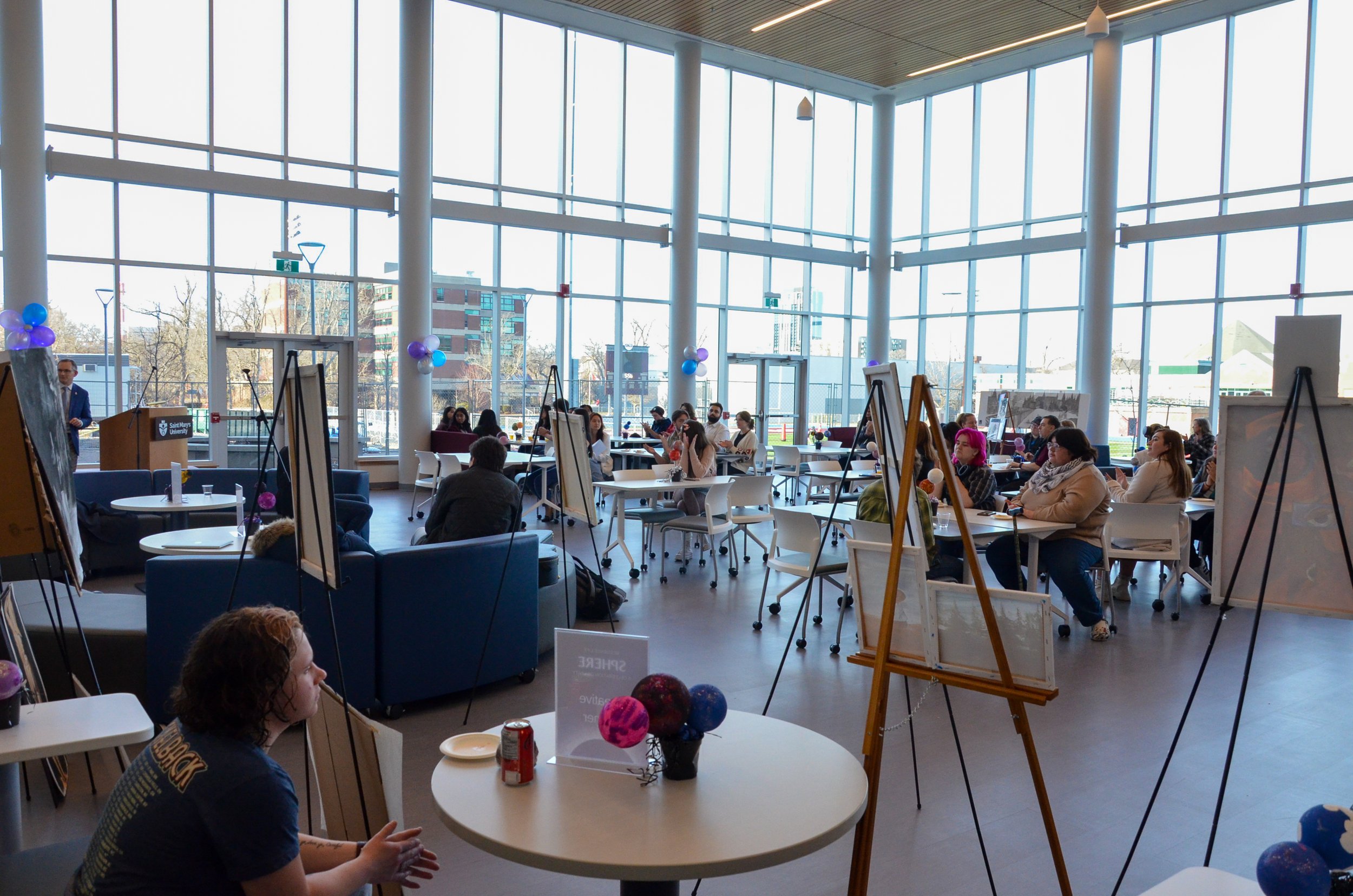
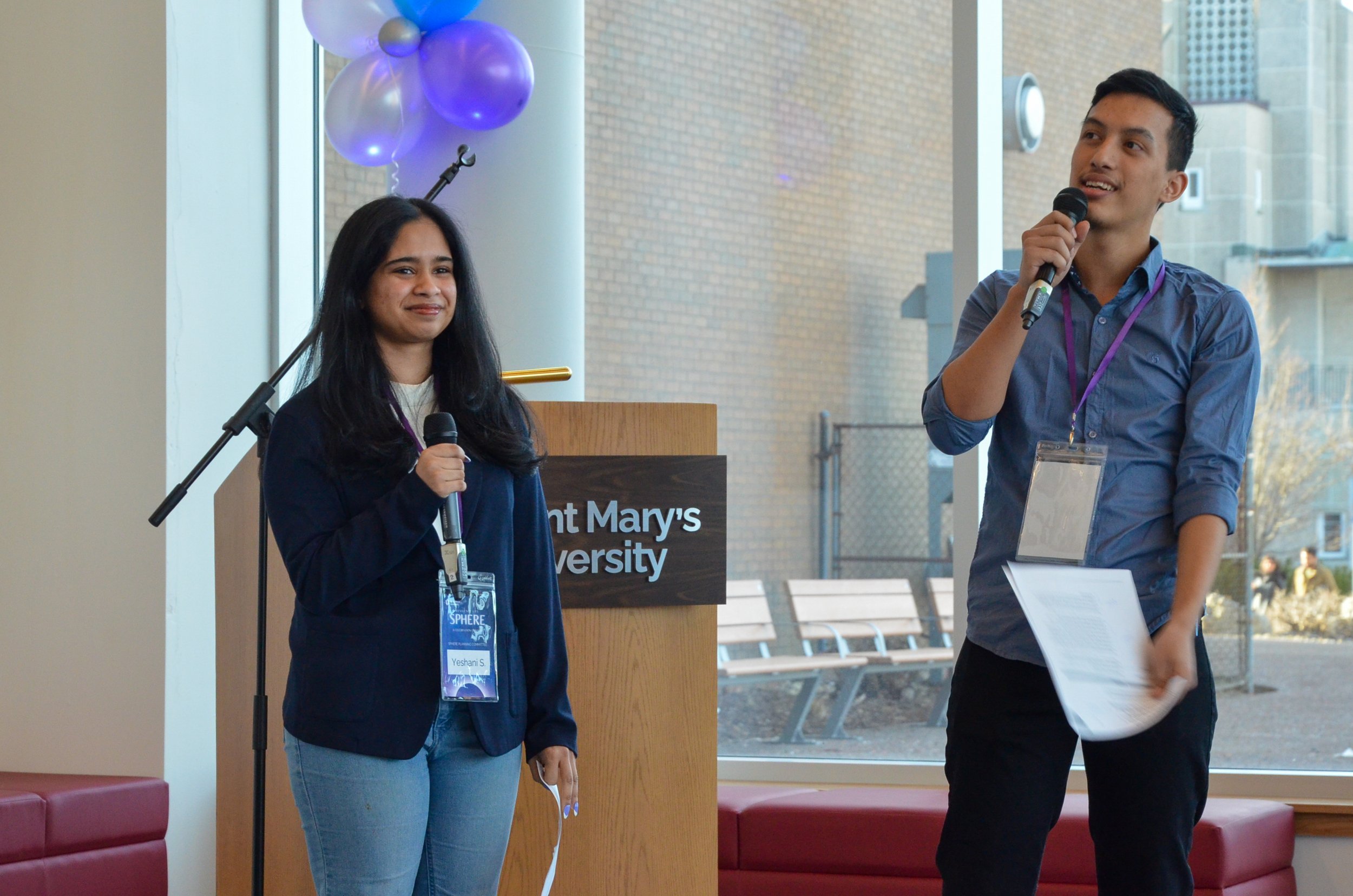

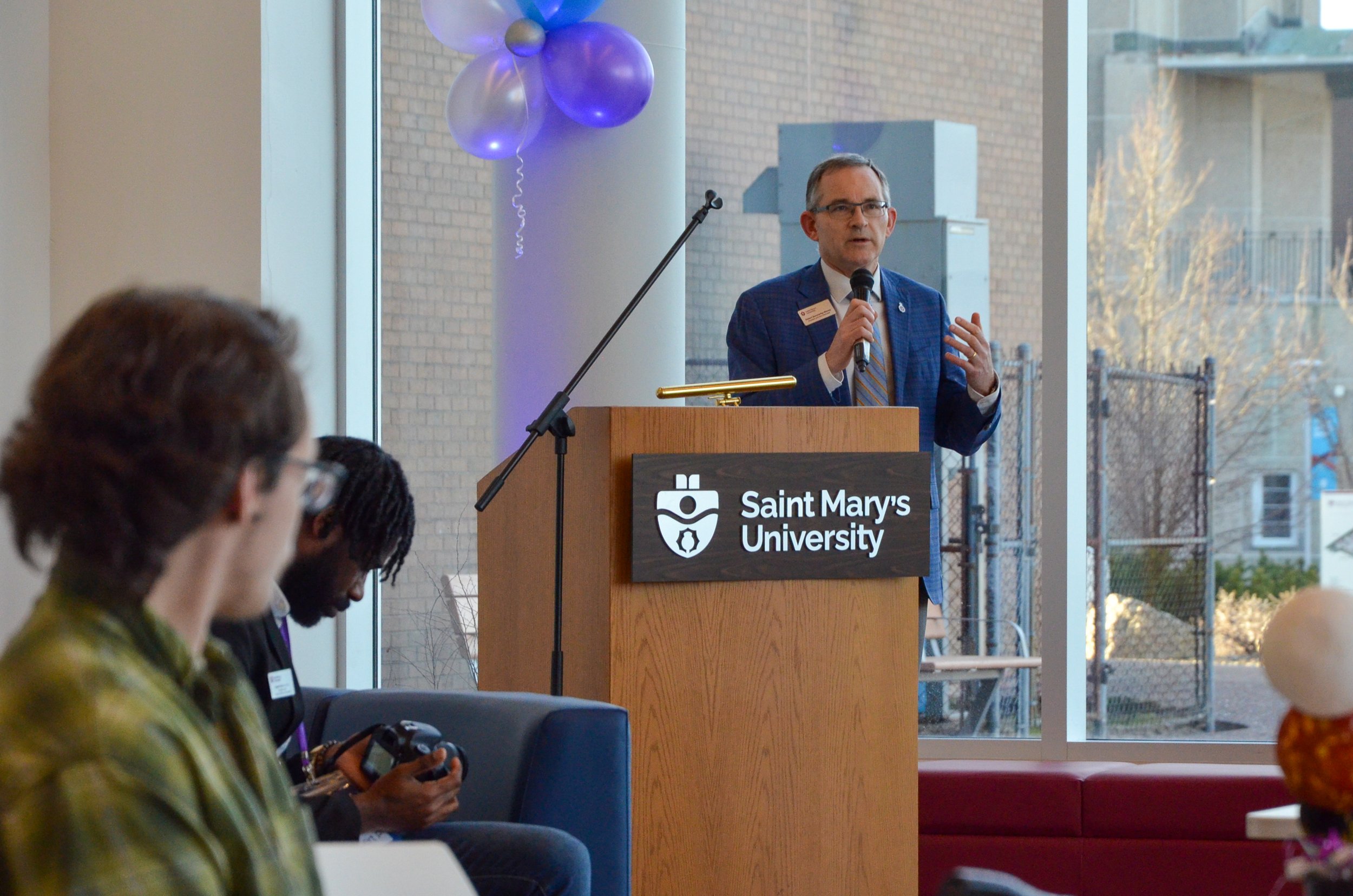
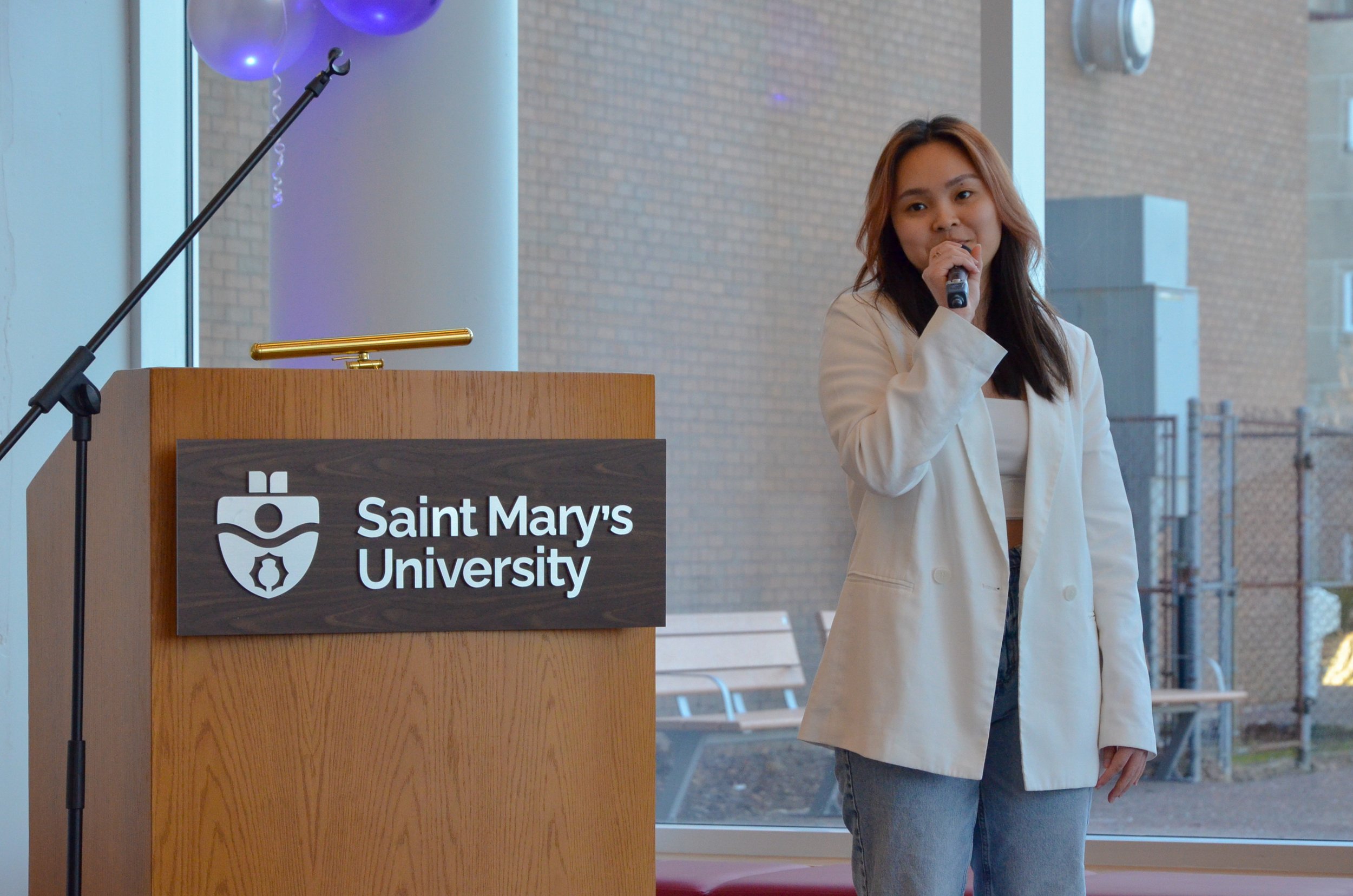
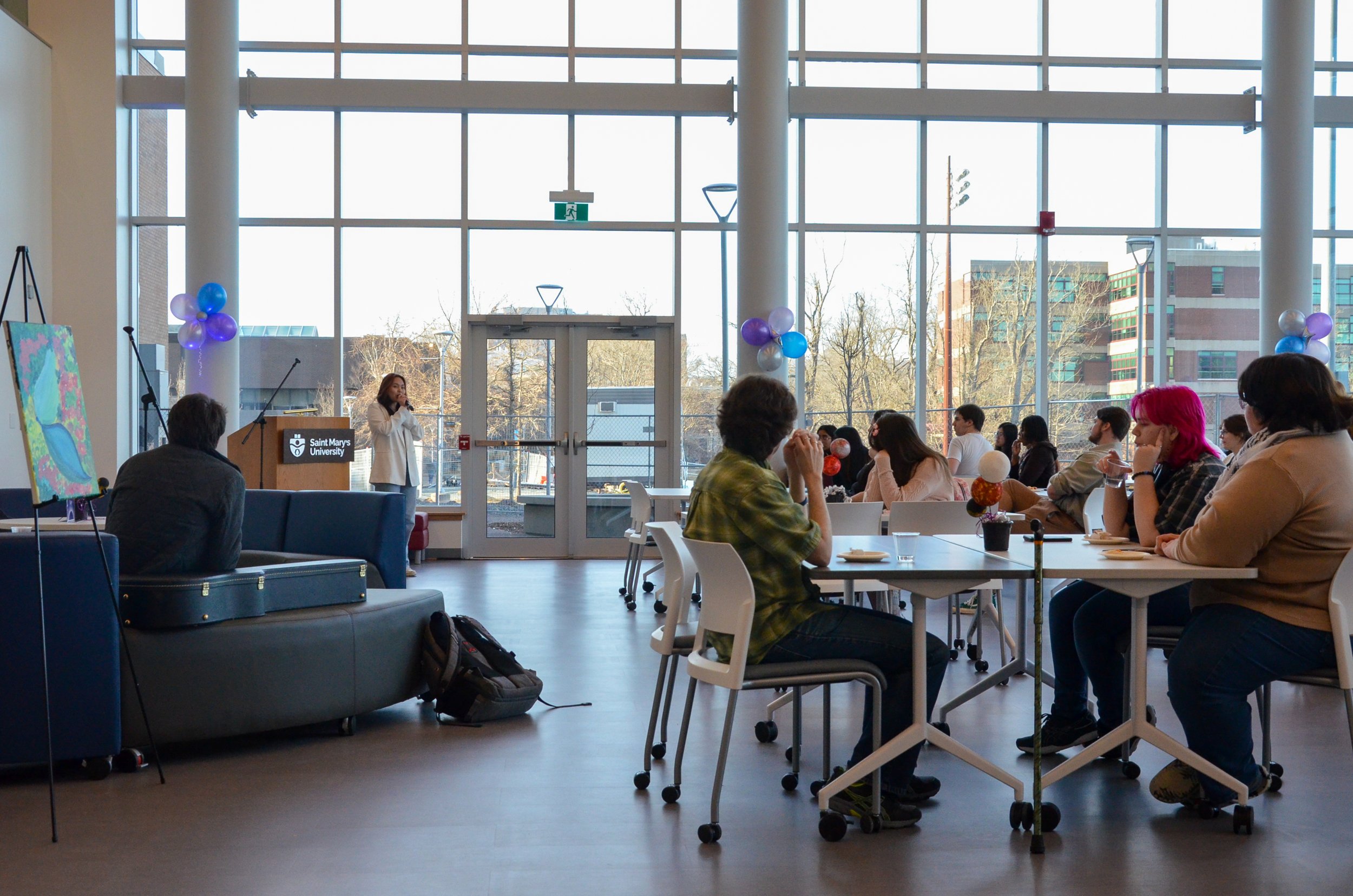
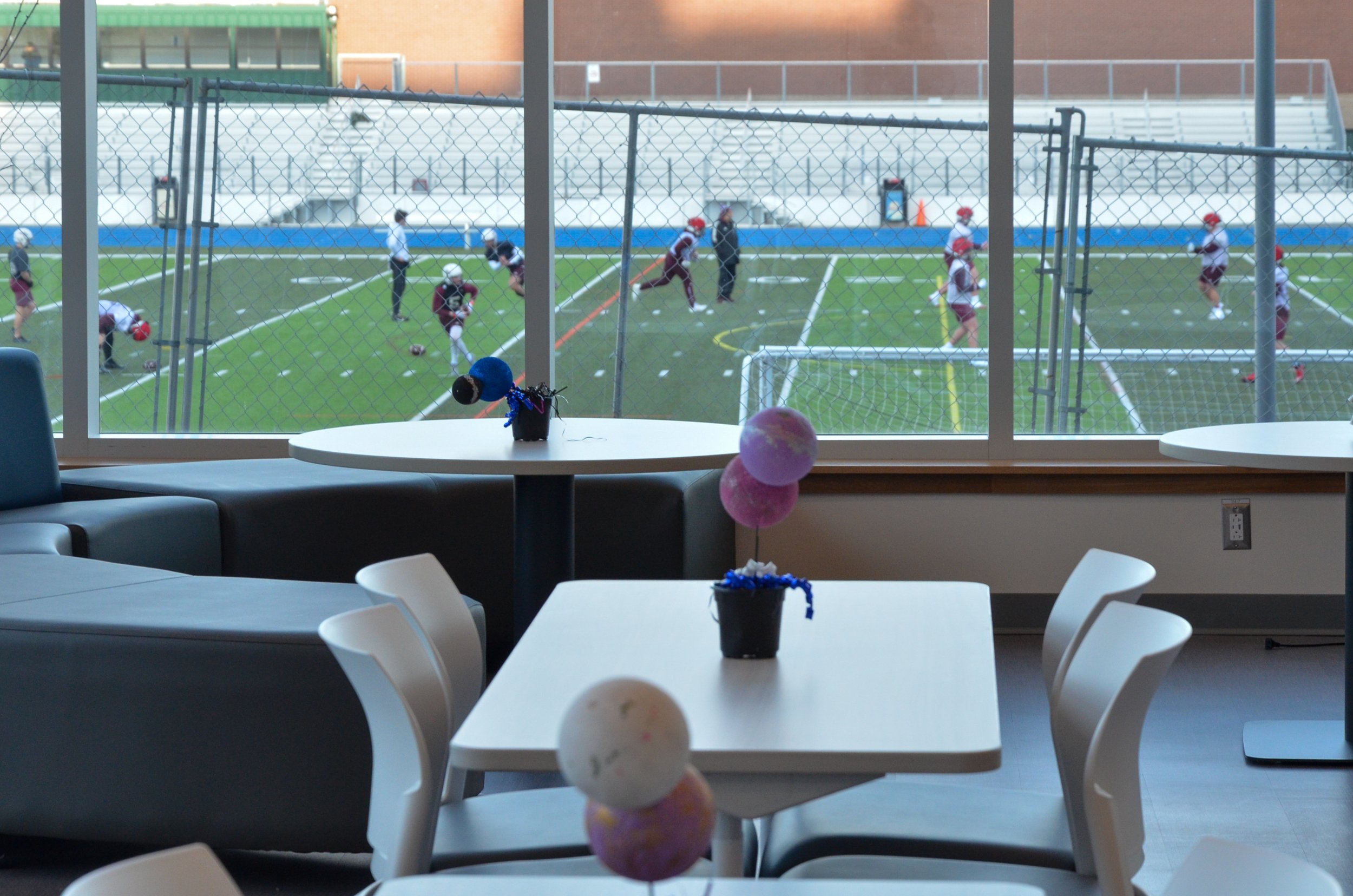
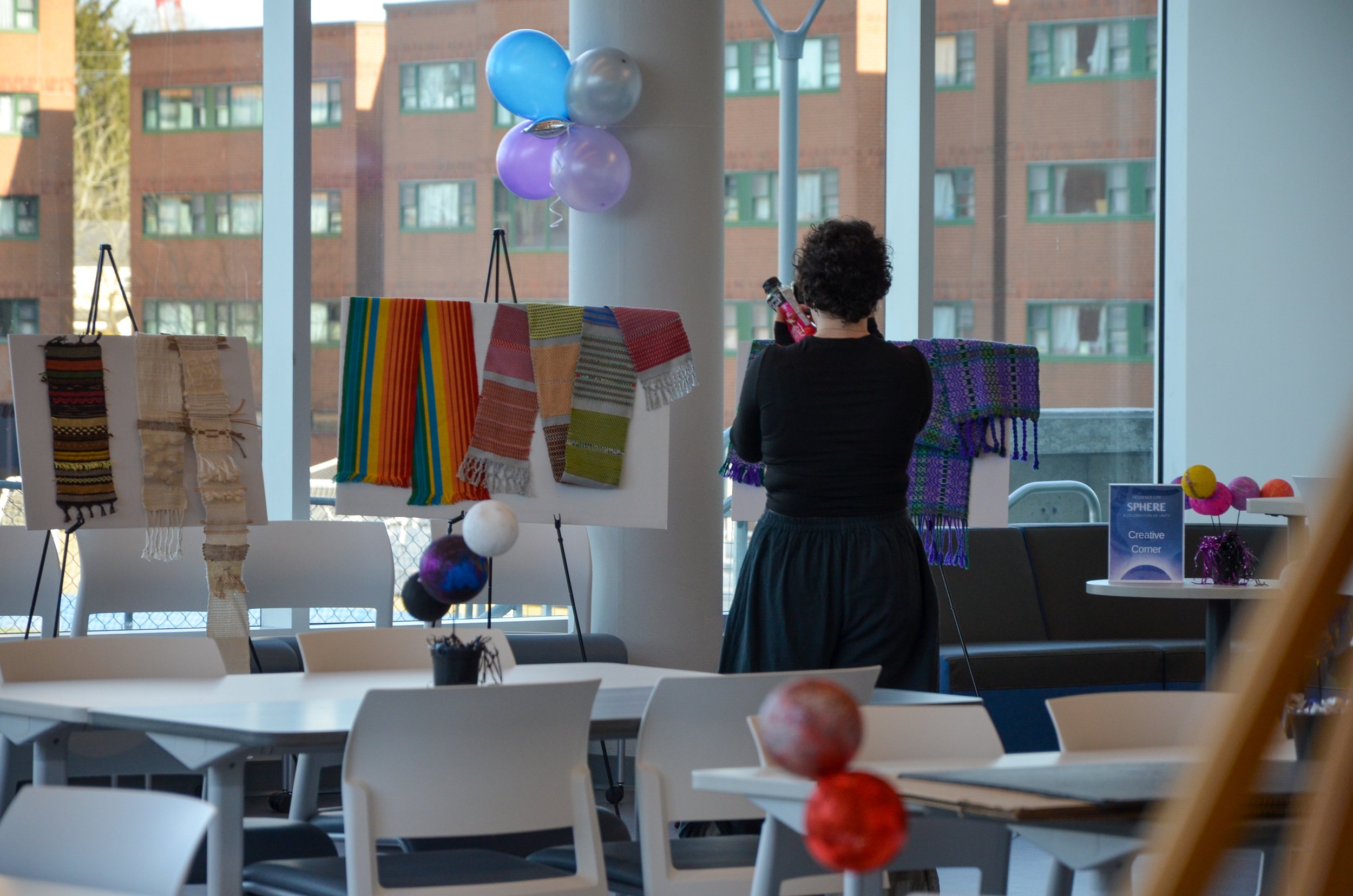
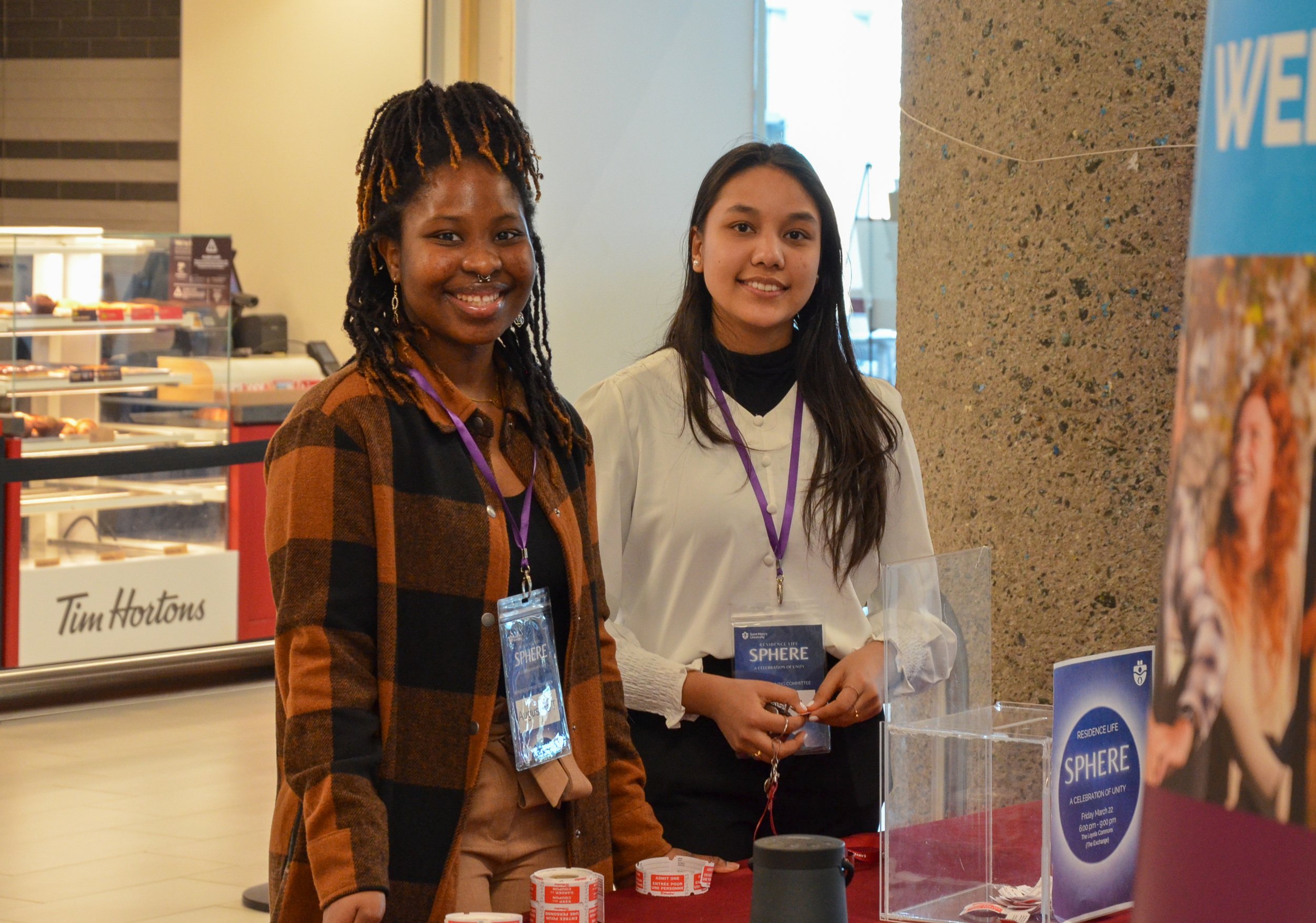
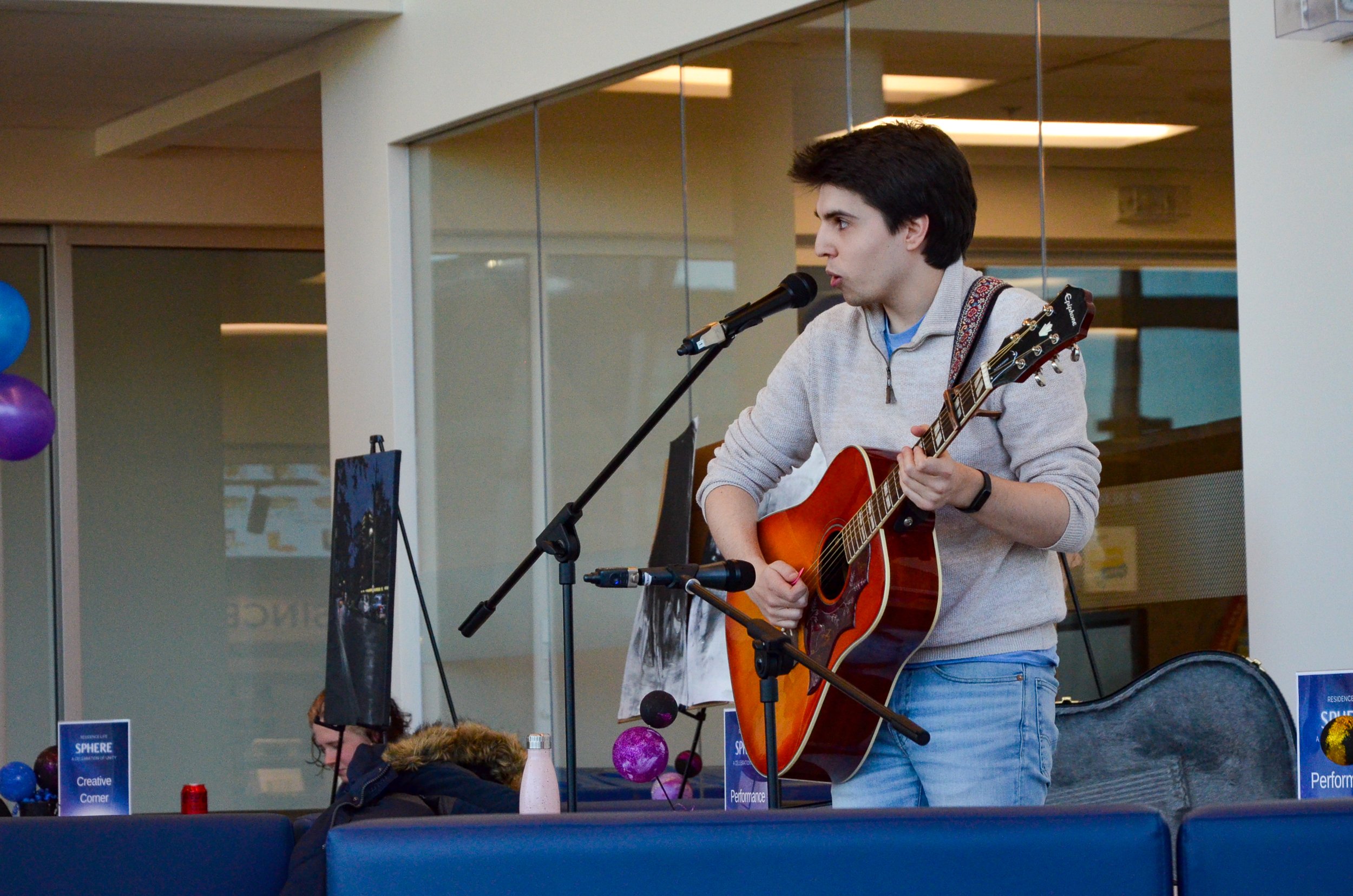
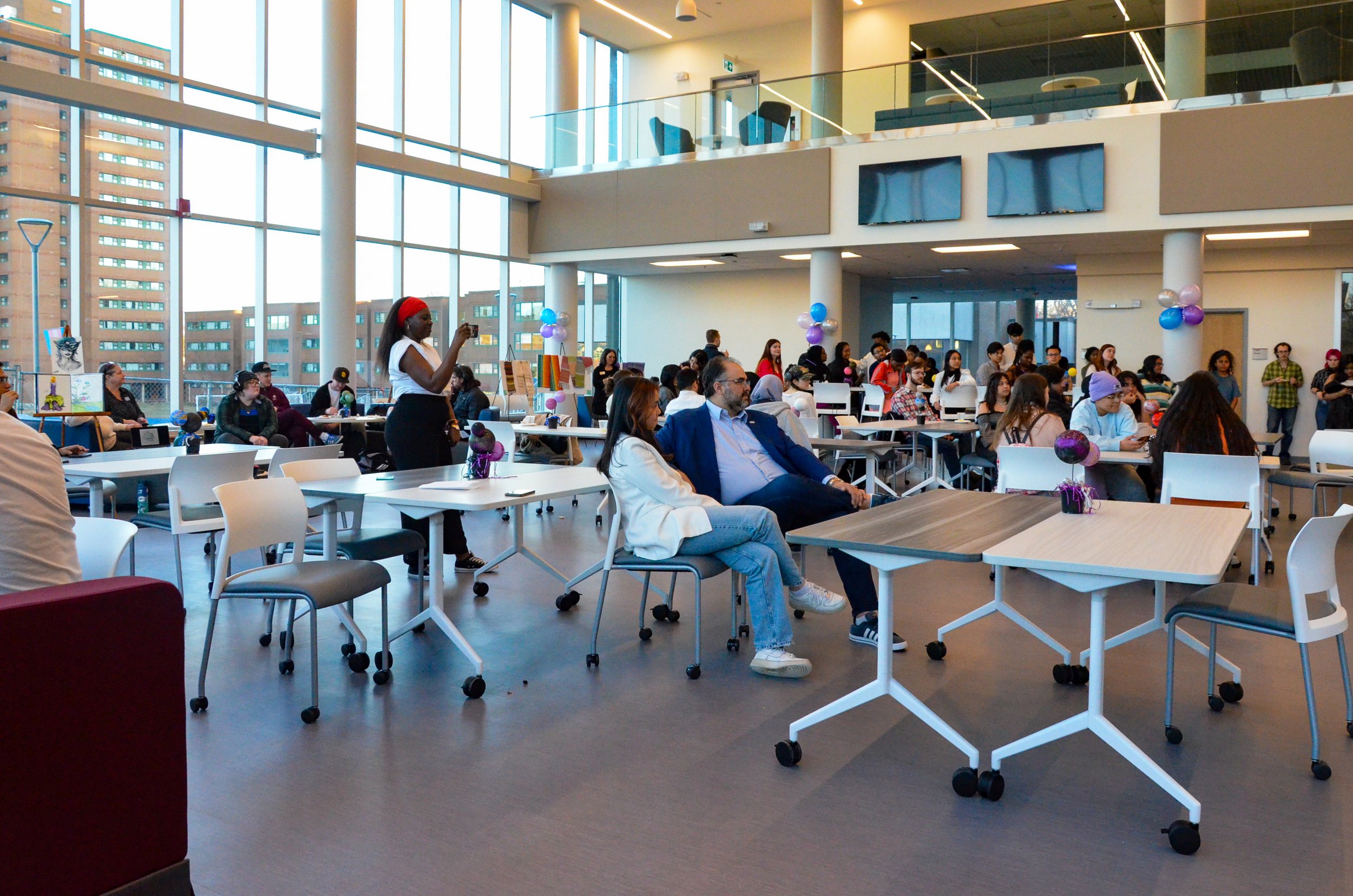
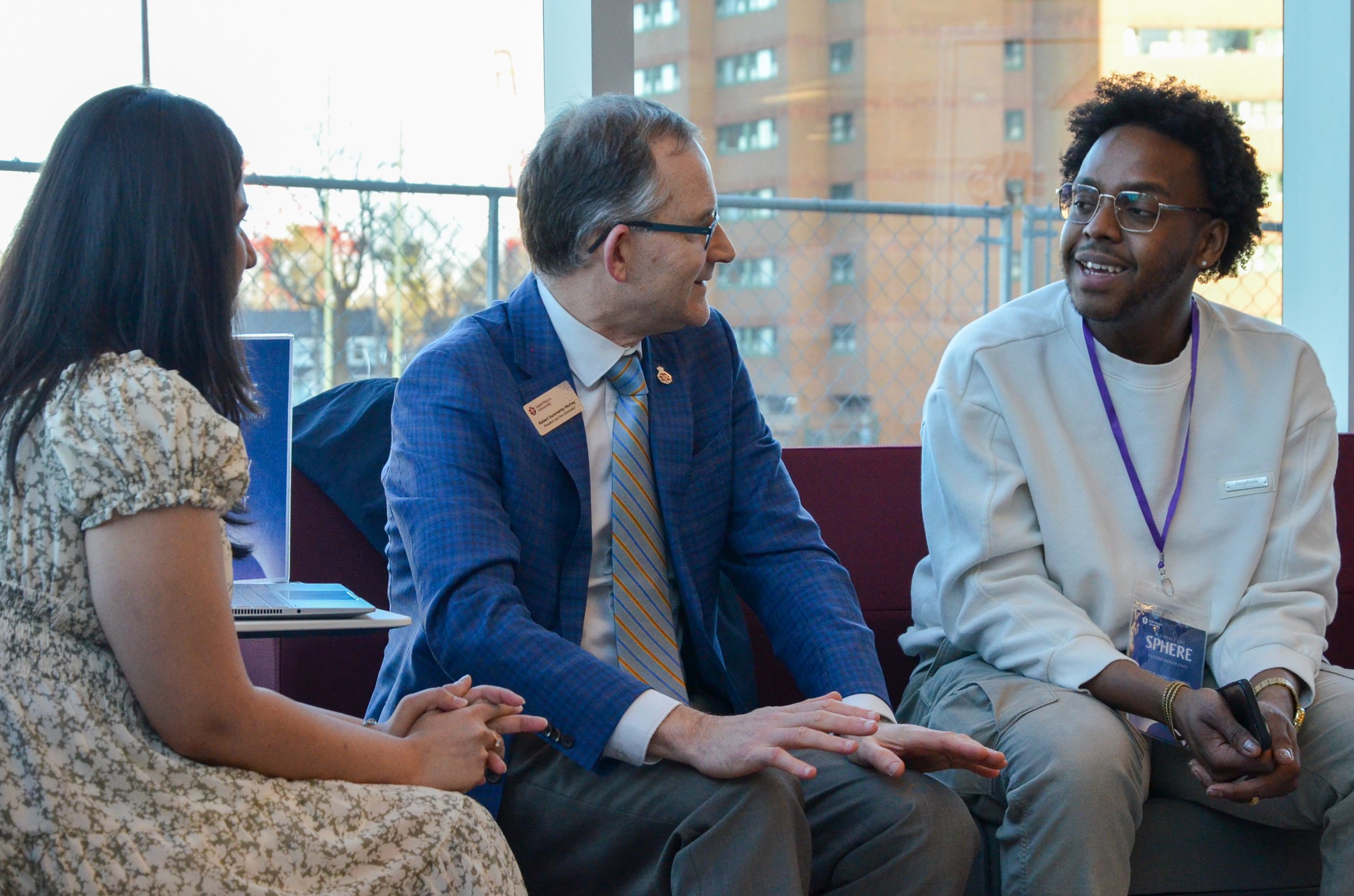
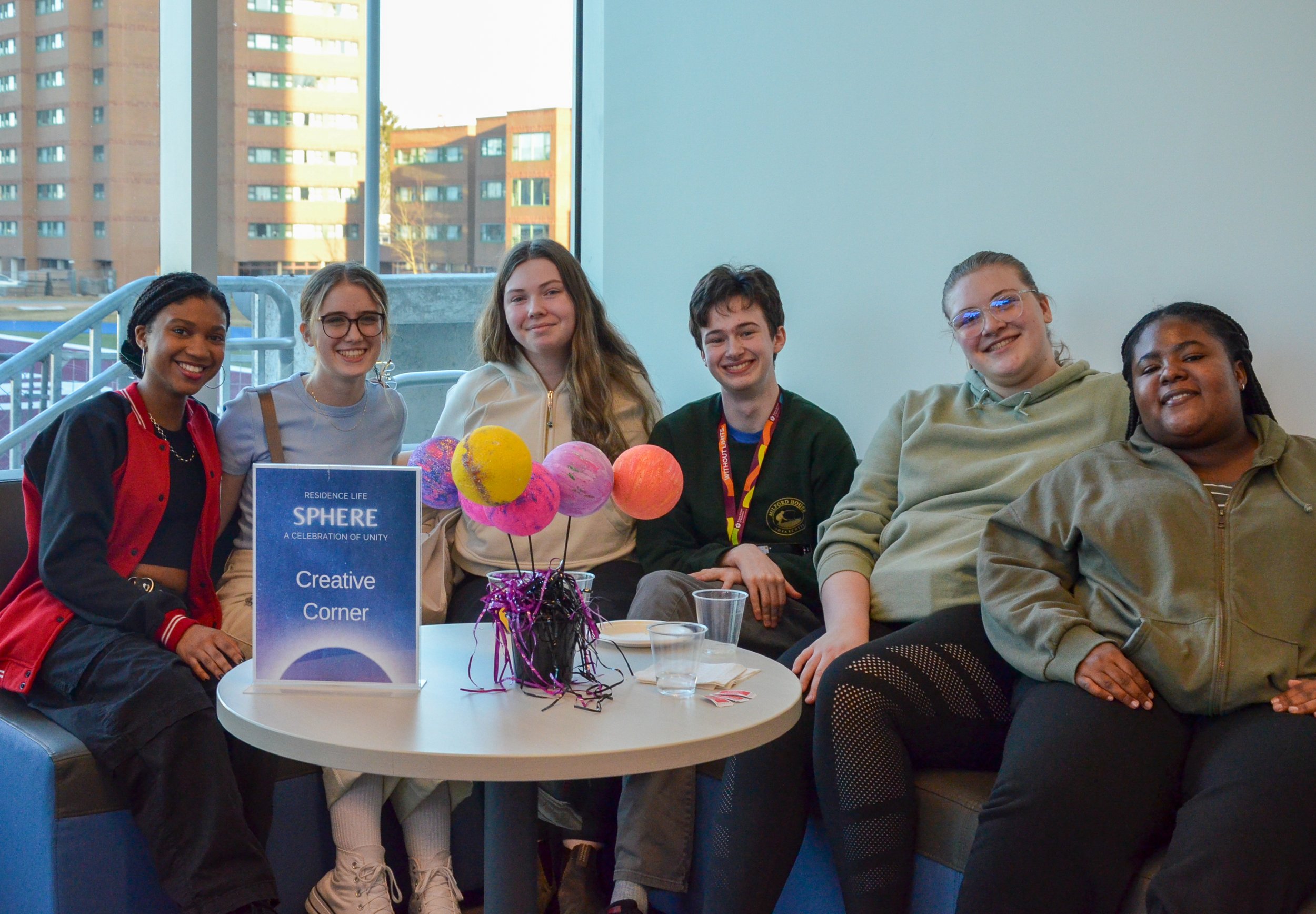
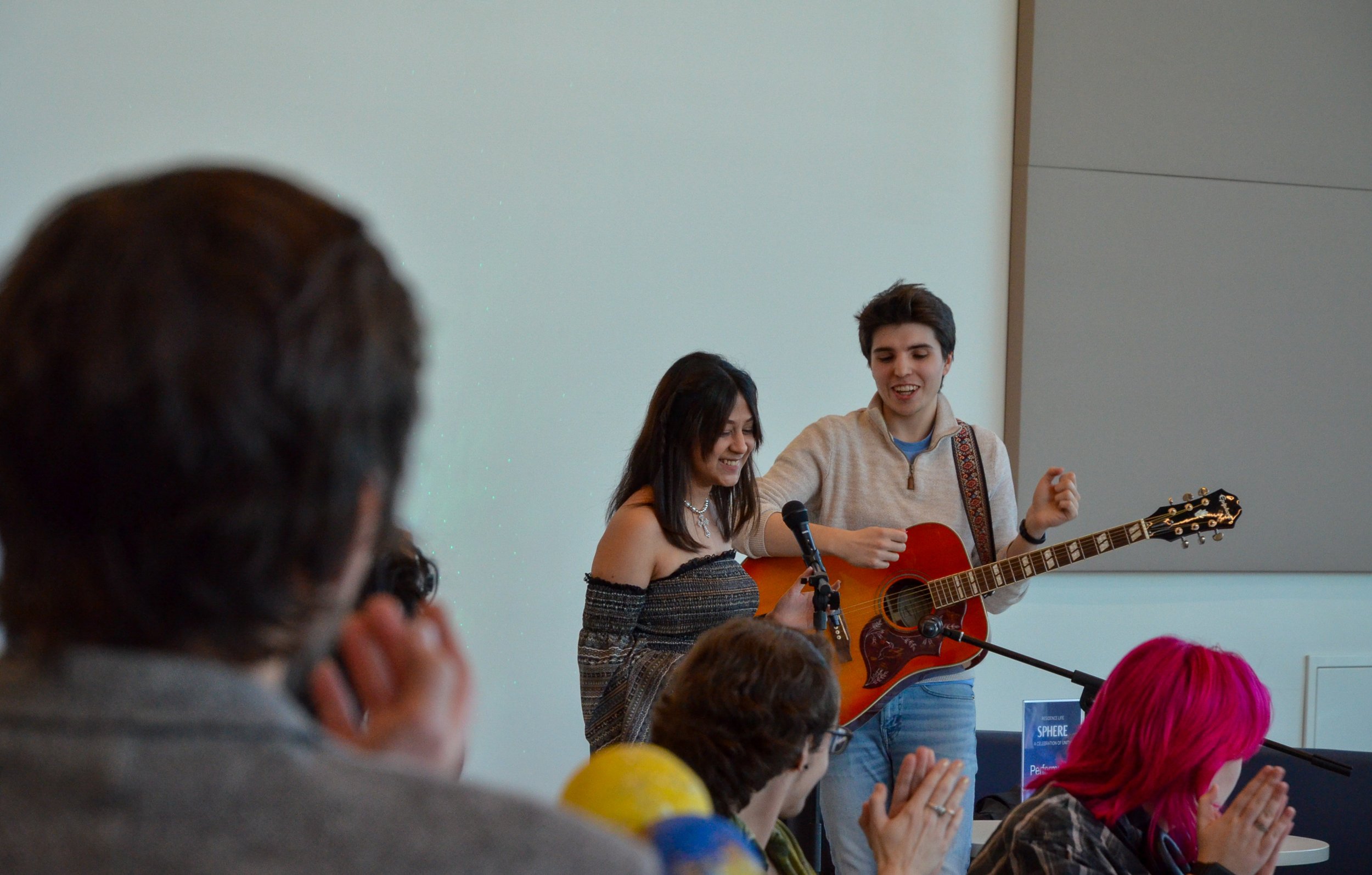


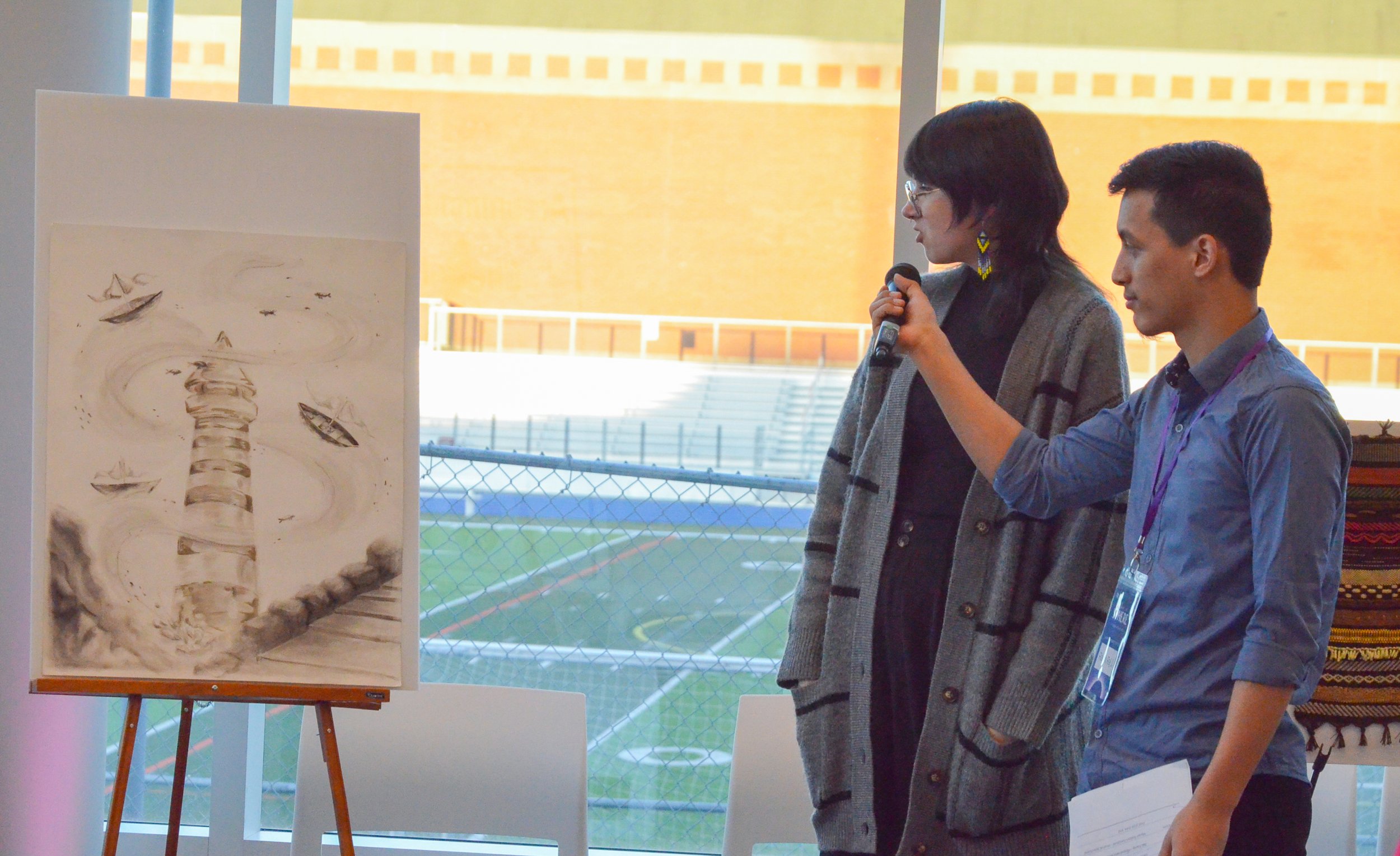

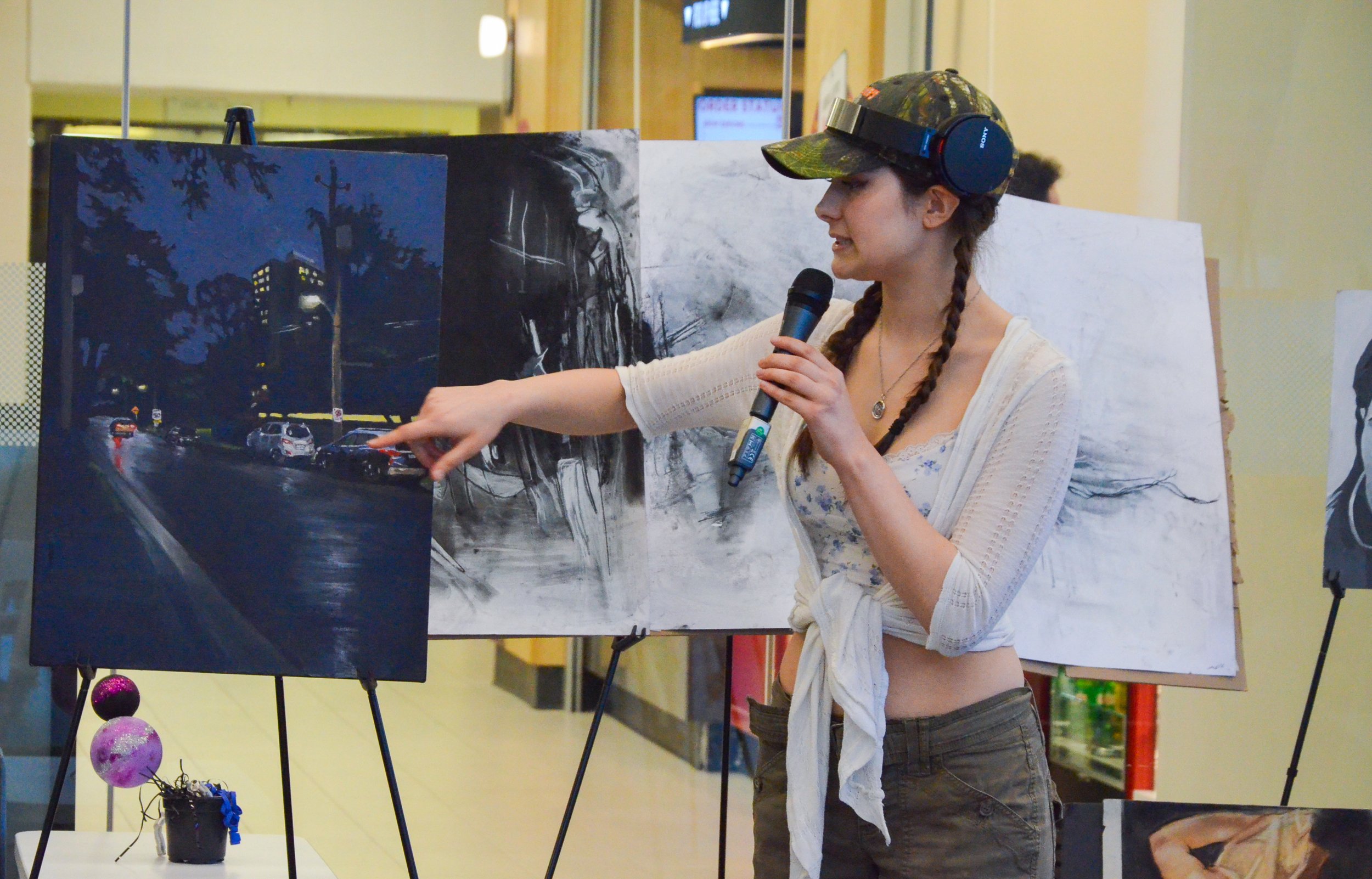
PWHL's Victoria Bach inspires young hockey players during campus visit
Victoria Bach (center) with SMU women’s Huskies hockey players
The Scott McCain & Leslie McLean Centre for Sport, Business and Health had the pleasure of hosting Victoria Bach from the Professional Women’s Hockey League (PWHL) at the Dauphinee Centre on campus on Sunday, April 14, 2024. Bach, originally from Milton, Ontario, and a member of the Mohawks of the Bay of Quinte First Nation, visited Halifax as part of a series of events organized by the Genevieve Francis Memorial Fund, initiated by SMU’s former Indigenous Visiting Fellow Ryan Francis.
The event was aimed at young girls who play hockey in Nova Scotia and drew approximately 50 spectators. Centre Director Dr. Cheryl MacDonald facilitated a question and answer session, followed by Bach raffling off a game-used stick and signing autographs. Later, she spent time with current members of the Huskies women’s hockey team.
As the session concluded, Bach shared her wisdom with the young attendees, saying, “Remember, every time you get the chance to step on the ice is an opportunity to get better.” She emphasized, “If you work really hard and have confidence in yourself, you’ll never have any regrets—whether it’s hockey or anything in life—and at the end of the day, have so much fun. That’s what it’s all about.”
Dr. Cheryl MacDonald and Victoria Bach speak with young hockey players
“What an incredible opportunity for the Centre to host not only a world champion and professional ice hockey player but also a member of a First Nation who serves as a role model for young Indigenous girls,” remarked Centre Director Dr. Cheryl MacDonald. “I extend my gratitude to Ryan Francis and the Genevieve Francis Memorial Fund for their partnership, and I appreciate Victoria for being so generous with her time today.”
Hours later, Bach’s PWHL Toronto head coach and Saint Mary’s alumni, Troy Ryan, led the Canadian national women’s team to secure a gold medal with an overtime victory over the USA at the 2024 International Ice Hockey Federation’s (IIHF) Women’s World Championship in Utica, New York. Bach had previously won gold with Team Canada in 2021 and 2022 and remains an integral part of the national program. She has also competed in the former Canadian Women’s Hockey League (CWHL) and the Professional Women’s Hockey Players Association (PWHPA) before joining the PWHL.
Bach holds a Bachelor of Communication from Boston University, where she made history as the first player to score over 100 goals in the women’s hockey team's program. She missed the first eight games of the inaugural PWHL season as she was completing teacher’s college through Brock University.
The McCain McLean Centre continues its monthly online speaker series on ice hockey culture on Wednesday, April 24, with Dr. Janice Forsyth (UBC) and Dr. Taylor McKee (Brock University), who will discuss Indigenous participation in ice hockey. Interested individuals can register to receive the Zoom link on the Centre website.











